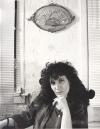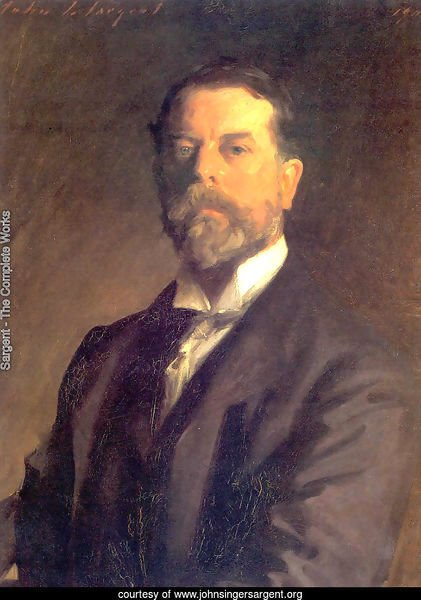The breakthroughs of Cole, Church, Eakins and Homer, who were largely self-taught, were new and completely American. Known as The Hudson River School, their work was popular in America and abroad. Before them, nature was not considered an appropriate subject for serious painters. Later the group formalized their work in an “Academy,” so it would not disappear. The Pennsylvania Academy of Fine Arts was based on the Hudson River School teachings. But their world was to change radically.

The Erie Canal made Boston a backwater to the leading metropolis, New York City. Though Boston possessed a school of painting that insisted on American inspiration, the Industrial Revolution brought a darkening of Yankee light. The aesthetics of The Hudson River School were overshadowed by the smoke of the Industrial Revolution. Factories and fortunes were to be celebrated in the new Gilded Age. John Singer Sargent (1856-1925) was considered by Winslow Homer one of the “New Men,” who studied in France in ateliers. They learned to draw and paint from plaster busts, imitating Italian Masters. They brought Impressionist techniques and theory to American painting, though many, like Sargent, lived in England and France.
**************
FASHIONED BY SARGENT (MFABoston) by Erica E. Hirshler, with Caroline Corbeau-Parsons, James Finch and Pamela A. Parmol, is the extraordinary companion book to the exhibition produced by two museums, the Museum of Fine Arts in Boston and the Tate Museum in Britain. It is available at D.A.P. (Distributed Art Publishers, $65.00). Besides the evolution of individual portraits, there are fascinating essays on the techniques of fashion (materials and design), social conventions in women’s dress, and the roles of class and politics. Photos of actual dresses worn or facsimiles constructed by the artist, reveal surprising design, fabric and finishes. Readers experience how portrait painting in Sargent’s hands was not only creating a likeness for family histories, but a vehicle for commentary on the personality of the sitter and milieu in which they lived.

Sargeant’s work, often reproduced in the press, became an event. Fame began with infamy, his scandalous portrait of Madame X. The glamorous American Madame Gautreau, the wife of a wealthy businessman, curated her “look” like a chic fashionista. Though she was an eager collaborator with Sargeant, her portrait was “no charge,” because he was an admirer of her style. Why was the portrait a scandal? The morals of France dictated formal outrage over a shoulder strap, but it’s suggested it may also have been a cultural slap at the effrontery of two Americans intruding on the French monopoly of chic. Sargeant, like many a celebrity after a scandal, retreated from France and public scrutiny. Eventually, he returned a star in demand for his incomparable renderings.
.
 |
| Helena (Ena) Wertheimer |
Rarely was a commission left unpaid (or undelivered). Portraits were essential, whether commissions were of aristocratic or nouveau riche origin. In the bridal portrait below, typically painted before the event, the young woman, Helena (Ena) Wertheimer was painted in a pose and attire far from that expected of aristocratic ladies. She’s like a Cavalier, wearing a plumed hat and a man’s cloak created from draped fabric with the hint the of a sword hilt. Sargeant admired the free spirited exuberance of this young woman, the daughter of a Jewish merchant, and honored it in a cross-dressing look.
“Dress”was a loose term for Sargeant, who routinely rejected couture gowns brought by his wealthy clients for fabric he draped and pinned into painterly shapes. He also used garments in his studio. Ironically, he once called himself “a painter and dressmaker,” because of the “looks” he devised for effect.
His bases were often black or white, used to focus character, How they were worn and accompanying objects were part of his total vision.
In his portrait of the beautiful Lady Helen Vincent, there is an improvised look.
Sargeant’s interpretations brought something new to American portrait painting. Eakins sitters sometimes failed to pick up their portraits because of his uncompromsing “honesty.” Sargeant challenged his sitters to see themselves through his enigmatic sensibility. If it was at odds with a husband’s view of his wife, or her feelings about herself, he was the Master. Most of his clients were glad to have his paintings.
In his portraits of men, character and roles in society were carefully enunciated. In Lord Ribblesdale, who Edward VII called the “ancestor,” Sargeant painted not just a known figure of the English aristocracy, but of an era on it’s way out. The Queen’s former “Keeper of the Hounds,”(whose portrait Sargeant pursued at no fee), lost that hereditary title and aristocratic influence. in the ascendency of the House of Commons. Sargeant took a hereditary costume and modernized it. Where the bottom garment might have appeared ridiculous, he created sleekness.
John D. Rockefeller Lord Ribblesdale

,

An interesting contrast to Ribblesdale is the portrait of the American mogul, John D. Rockefeller. The shades of white are enhanced by the black jacket. Legs crossed casually, hands ready, a face with a set expression, show the character of an original.
Dr. Pozzi at Home caused an uproar in England for painting a professional man so casually. While the U.S. critics thought the flamboyant robe and posture made him effeminate. The robe was a pre-made garment, as was the costume the actress Ellen Terry wore for her portrait.
The “immortal” actress’s portrait, commissioned by her equally famous stage partner Henry Irving, was to be in everyday dress. But when the artist saw her robes in “Macbeth” onstage, he made a sketch. The dress, made of beetle wings, was so unique, Sargent convinced her to wear it for her portrait. Here she is in character, as Lady Macbeth.
Dr. Pozzi at Home Ellen Terry as Lady McBeth
When Sargent stopped painting portraits, the authors relate it to Baudelaire’s declaration “that color had an essential independence.” In Sarent’s work , they say, we see the independence of paint. It is here in this tremendous self-portrait. Here also is a wonderful oil painting of Capri
While I love the light and joy in many of his landscapes, the portraits are singular. Sargent’s sitters seem aware of their moment in time. FASHIONED BY SARGENT is a fabulous journey.
S.W.





.jpg)













